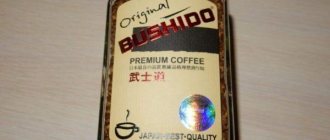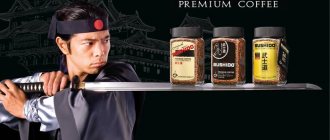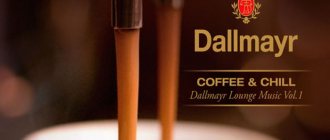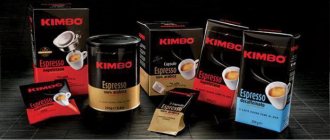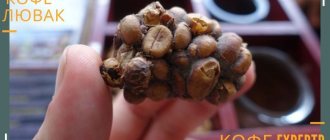On the shelves of supermarkets and coffee shops, customers see the Bushido brand, coffee with an oriental flavor. Appearing in Russia at the beginning of the 21st century, it quickly took pride of place on the menu of domestic coffee lovers.
The concept of a premium Japanese-style drink was developed by one of Germany's leading advertising agencies.
Trademark "Bushido": history and description of the brand
In Japanese, Bushido means “samurai code of honor.” The history of the brand’s creation begins in the Land of the Rising Sun, where coffee was second in popularity to tea. Moreover, instant drinks were not in demand. In the 90s of the last century, enterprising businessmen tried to prepare a light-roasted freeze-dried variety. Consumers liked the new product, but grain and ground varieties began to be sold only 10 years later.
All products called “Bushido” are produced in Switzerland at the HACO Ltd. plant, and masters from Italy work on the blends.
In Russia, the coffee customer is Hors Ltd., which also owns other brands:
- Egoiste;
- Infinity;
- Today;
- Elza;
- "Moskoffee"
The packaging design with hieroglyphs, recognizable among other cans and bags, was developed by the German advertising agency Kakoi. Due to the unusual design, many consumers believe that they bought real coffee from Japan.
You can buy Bushido coffee as Swiss, but don't think it's Japanese.
Brand uniqueness
Despite the symbolic Japanese name, Bushido brand products are manufactured in distant Switzerland. A unique grain processing technique and initial production were developed by Japanese craftsmen. For the first time, the company presented dissolved coffee under the Bushido brand.
Its production was designed for domestic consumers. At home, the product gained enormous popularity. Positive reviews about the impeccable taste of Bushido instant coffee forced the company's owners to expand the range and entrust the production of natural coffee to Swiss partners.
This country was not chosen by chance. Firstly, the Swiss climate is ideal for natural cooling of roasted beans with alpine mountain air, and secondly, local specialists are famous for their professionalism and thoroughness.
A special role is played by a professional master, who must carefully monitor the roasting process, adjusting the temperature at low levels so that the grains are roasted evenly. The mountain alpine cool helps preserve the drink's aromatic esters and a sufficient degree of moisture.
Secrets of coffee production
The harvested crop is sorted and the best raw materials are sent to Swiss and Italian factories. There it is manually roasted for 25 minutes over low heat (at about 220°C) in wood-burning ovens and cooled in the fresh air for 10 days.
Roasting is carried out under the supervision of masters who continuously monitor the process.
Varieties of instant Bushido
All categories of Bushido coffee sold belong to the premium segment. There are several types available to buyers.
Red Katana
To produce Bushido Red Katana, Arabica beans of different varieties are used. The place where the raw material grows is East Africa. The prepared drink is strong and tart, moderately bitter.
Consumers note that it is similar to espresso coffee prepared in a coffee machine from ground fruits.
The aftertaste has wine notes. Before roasting, the grain is deep frozen. The finished product is packaged in bright red jars or bags.
Among the taste features of Bushido Red Katana are the presence of wine notes and a long aftertaste.
Black Katana
The crops from the plantations of Central and South America are brought from which the Veracruz mixture is made. It is the main ingredient of this type of coffee with a special taste and aroma. During consumption, an unobtrusive sourness and a slight smell of freshly baked bread and prunes remain in the mouth.
Before cooking, the grains are fried over hot coals, which is why this variety is also called “smoked.”
The finished drink is sometimes confused with the one prepared in Turk and people are surprised when they find out that it is a soluble variety of Bushido. Its packaging or label is black.
The manufacturer roasts coffee beans on hot coals, due to which the product acquires the aroma of campfire smoke.
Light Katana
This variety has a softer, velvety taste, with fruity undertones. For roasting Arabica beans grown on Kilimanjaro plantations in Kenya, a special, gentle regime without high temperatures is used. At the plant where the product is prepared, the mixture for the Katana Light brand is called Kenyvaro by analogy with the country of origin. Her stickers on jars and packaging bags are pink.
Bushido Light Katana instant freeze-dried coffee is good for breakfast.
Original
The birthplace of coffee, the basis of which is the Buenaventura blend, is South America. Its balanced aroma with tart bitterness will appeal to those who like to add a little milk and sugar to the drink. The medium roasting method is called City.
A characteristic feature of Bushido Original is its balanced aroma, as well as the presence of a characteristic bitterness.
Katana Gold 24 carat
The special Bushido variety contains particles of edible gold in the form of additive E 175. Marketers say that Katana Gold coffee prolongs youth, renews and restores the skin. No one has yet undertaken to prove the veracity of this statement, but even critics do not dispute that the drink is not only harmless, but also tasty.
Honey and chocolate flavors give it a spicy kick.
The packaging in the color of noble metal looks expensive, which makes it possible to purchase this variety as a small gift.
Additive E175 is not harmful to health; it has a neutral taste and aroma.
Kodo
This variety is preferred by lovers of the “ground and instant” type of coffee. For production, arabica beans are brought to factories from South America, Tanzania and Ethiopia. The manufacturing technology is called In-Fi.
Granulated coffee particles are encased in a sublimated crystalline shell, making it more like a freshly ground drink brewed in a Turk.
The floral aroma is complemented by a honey-fruity taste and a sweet aftertaste.
Bushido Kodo coffee has a sweet aftertaste and floral aroma.
Range
The line includes instant, bean and ground coffee. The full range is presented on the Horse website, and on the brand portal there are only 4 soluble types. A huge variety of other types are sold on the markets of other countries; there is also a special Wood series that is made in Italy, but there is no emphasis on Japan. But in Russian stores and websites you will usually find the following offers:
Red Katana
Red Katana (Red Katana) is a proprietary blend called Paranagua, granulated from various types of Arabica from East Africa. The packaging is a catchy reddish color. Quite strong, slightly tart. The taste has wine notes, a rich aroma, and a long aftertaste.
Black Katana
There are also names of Merc Katana (Dark) - in jars with a dark label. A blend of grains from Central and South America; the manufacturer calls this instant mixture Veracruz. It is also called “smoked” because it is roasted over hot coals and takes on the palpable smoky notes of campfire and coal. The strongest and densest of the entire line, you can clearly feel the bitterness in the aftertaste.
Light Katana
The pink packaging of instant Light Katana hints that the grain is light roasted, the taste is light, unobtrusive, velvety. Arabica from Kilimanjaro plantations with a rich aroma, Kenyvaro proprietary blend. Delicate fruity colors are felt, a slight sourness is detected. The aftertaste is soft.
The blend called Buenaventura is an instant drink, a mixture of grains from different plantations in South America. It has a narrow, balanced aroma and a slightly bitter taste. The original is suitable for those who like to drink Bushido coffee with milk and sugar.
Katana Gold 24 carat
But this is something special - Bushido instant coffee, to which particles of edible 24-karat gold are added (additive E175). The Katana Gold drink is credited with a huge number of healing properties - prolongation of youth, renewal and restoration of the body and skin. In any case, edible gold is definitely harmless, it does not change the smell and taste of the product, and the drink looks interesting, so it might be worth taking as a gift.
Original, grain and ground
Highland Arabica Grand Cru. The manufacturer promises a wonderful smell and great taste, but without any details. Buyers note that the smell lasts a long time and it is really catchy and captivating; notes of chocolate and caramel are felt in the taste. On the can of ground coffee it is indicated that Robusta has been added, on the beans it says Arabica.
Specialty, beans and ground
Offered as an exclusive blend of beans from the 1st harvest, hand-roasted. There is a slight pleasant bitterness, balanced sourness, and a harmonious taste. Contains 100% Arabica.
From time to time on store shelves you can see cans with the inscription Black Limited Edition, but it is actually not found online - supplies and production have apparently ended.
Wood Roasted Coffee
This is a separate line of the brand, which is made at the request of the same Hors (Betamax), but in Italy. Positioned as Bushido coffee beans or ground, wood-roasted.
- Forte – Arabica beans from Tanzania and Kenya, roasted over oak wood, which imparts extraordinary astringency and richness;
- Delicato – a mixture of Arabica beans from Colombia and Ethiopia, a softer drink, the beans are roasted over the firewood of orange trees;
- Intenso - made from 100% Arabica beans from Colombia and Kenya, roasted on olive tree branches, the taste is juicy, rich, with nutty notes.
These packages differ from glass jars of Bushido instant coffee, the manufacturer is different, the labels are in British and Russian.
Types of ground
in this category :
- Bushido Original is a blend of Robusta and Arabica beans. It has a moderate strength, rich taste, and pleasant sourness. Coffee of this brand is packaged in cans with a capacity of 250 g.
- Bushido Specialty is blended from beans of the same varieties, hand-roasted and naturally cooled. After grinding, the blend is placed in vacuum bags with a special layer and a sealed valve. As a result, a bitter drink with chocolate notes retains its aroma and taste characteristics for as long as possible.
Assortment of bean coffee
The raw material for coffee beans is hand-roasted Arabica. Small batches of coffee are served over dry heat, which helps preserve the taste, aroma and beneficial properties.
Grand Cru
This variety is supplied to stores not only in grain form, but also ground with the addition of robusta. The harvest is harvested on high mountain plantations, from where it is directly supplied to a Swiss enterprise. The finished drink has caramel and chocolate notes with a long aftertaste.
Specialty
To prepare the blend, raw materials from different harvest years are never used—only grains harvested in the same season are roasted by hand. When tasting coffee, consumers feel a slight bitterness and sourness. For packaging at the factory they use tin cans with a beautiful design.
Bushido Specialty is distinguished by the presence of light bitterness, balanced by sourness.
Ground coffee
In addition to instant products, the Bushido brand also produces natural products in grain and ground form:
- Grand Cru ground coffee is made from highland Arabica beans with the addition of Robusta. The natural drink made from this product has a bright, rich aroma. At the same time, the coffee smell is persistent. Its taste is distinguished by the presence of chocolate and caramel notes.
- Another ground natural coffee of this brand is Specialty . A distinctive feature is the medium manual roasting of the beans. After the product has cooled, it is crushed and packaged to preserve the aroma of the grains and their taste. This Bushido ground coffee is made from 100% Arabica beans.
Wood Roasted Coffee
Mixtures in this category are prepared exclusively in Italy. The fuel for wood stoves is oak, olive and orange wood.
During roasting, grains go through several stages:
- homogenization, or imparting homogeneity to the substances found in the seeds, at a temperature of 60-100°C;
- drying at 100-150°C;
- the Maillard reaction to induce interactions between amino acids and sugar at 150-200°C;
- ripening, which imparts flavor and aroma characteristics at 200-220°C;
- cooling to 20°C.
The secret to the unique taste of coffee is an exceptional combination of roasting phases.
Buyers are offered 3 types of products:
- Bushido Delicato with fruity flavor notes and jasmine aroma. Raw materials from Colombia and Ethiopia are prepared using orange wood.
- Bushido Forte from Tanzania and Kenya on oak logs with flavors of berries, smoke and citrus. The mixture contains only Arabica.
- Bushido Intenso on olive wood. The consumer will smell caramel and hazelnut. His harvest grows in Colombian and Kenyan fields.
All varieties are roasted over medium heat and produced in ground and grain varieties.
Each type of coffee, as well as the wood used, has its own individual roasting schedule.
Range
The line includes instant, bean and ground coffee. The full range is presented on the Horse website, and on the brand’s portal there are only 4 soluble types. A huge variety of other varieties are sold in the markets of other countries; there is also a special Wood series, which is manufactured in Italy, but there is no emphasis on Japan. But in domestic stores and on websites you will usually find the following offers:
Red Katana
Red Katana (Red Katana) is a proprietary blend called Paranagua, granulated, from different Arabica varieties from East Africa. The packaging is bright red. Quite strong, slightly tart. The taste has wine notes, a rich aroma, and a long aftertaste.
Black Katana
There are also names Black Katana (Black) - in jars with a black label. A blend of grains from Central and South America; the manufacturer calls this instant mixture Veracruz. It is also called “smoked”, as it is fried over hot coals and acquires noticeable smoky notes of fire and coal. The strongest and densest of the entire line, you can clearly feel the bitterness in the aftertaste.
Light Katana
The pink packaging of instant Light Katana hints that the grain is light roasted, the taste is light, unobtrusive, velvety. Arabica from Kilimanjaro plantations with an intense aroma, Kenyvaro proprietary blend. Delicate fruity shades are felt, the sourness is barely noticeable. The aftertaste is soft.
Original
A blend called Buenaventura is an instant drink, a mixture of grains from various plantations in South America. It has a delicate, balanced aroma, with a hint of bitterness in the taste. The original is suitable for those who like to drink Bushido coffee with milk and sugar.
Katana Gold 24 carat
But this is something special - Bushido instant coffee, to which particles of edible 24-karat gold are added (additive E175). The Katana Gold drink is credited with many healing properties - prolongation of youth, renewal and restoration of the body and skin. In any case, edible gold is definitely harmless, it does not change the smell and taste of the product, and the drink looks interesting, so it might be worth taking as a gift.
Original, grain and ground
Highland Arabica Grand Cru. The manufacturer promises a great aroma and amazing taste, but without any details. Buyers note that the smell lasts a long time and it is really bright and interesting, with notes of chocolate and caramel in the taste. On the can of ground coffee it is indicated that Robusta has been added, on the beans it says Arabica.
Specialty, beans and ground
Offered as an exclusive blend of beans from the same harvest, hand-roasted. There is a slight pleasant bitterness, balanced sourness, and a harmonious taste. Contains 100% Arabica.
Sometimes on store shelves you can find cans with the inscription Black Limited Edition, but it is practically never found online - supplies and production have apparently ended.
Wood Roasted Coffee
This is a separate line of the brand, which is produced at the request of the same Hors (Betamax), but in Italy. Positioned as Bushido coffee beans or ground, wood-roasted.
- Forte – Arabica beans from Tanzania and Kenya, roasted over oak wood, which gives a special tartness and richness;
- Delicato – a mixture of Arabica beans from Colombia and Ethiopia, a softer drink, the beans are roasted over orange wood;
- Intenso - made from 100% Arabica beans from Colombia and Kenya, roasted on olive tree branches, the taste is juicy, rich, with nutty notes.
These packages differ from glass jars of Bushido instant coffee, the manufacturer is different, the labels are in English and Russian.
Criteria and nuances of product selection
It is impossible to give unambiguous recommendations for purchasing Bushido brand products: all of them are of high quality.
But there are a few tips worth heeding:
- You should focus on your own taste and use information from the company’s official website.
- You need to take into account the cost of the product. The more expensive the variety, the higher its organoleptic properties.
- When purchasing, you should look at the cooking method. The difference between instant and natural drinks is quite large.
- The place of production matters. The Italian line differs from the Swiss line in its specific taste.
All reliable information about coffee can be found on the official website of the Bushido company.
Detailed description of the brand of elite and original Japanese coffee Bushido
Bushido coffee is a Swiss product, although its idea belongs to the Japanese. The raw material for production is high-quality Arabica. Description of the taste Bushido says. that it is rich, rich. Each type of product has its own notes: tart, with the aroma of a fire, fruity. This drink will appeal to connoisseurs of the classic drink and lovers of products with fruity or caramel undertones.
Ways to distinguish from a fake
Like any popular product, Bushido coffee is often counterfeited.
To avoid buying counterfeit products, you need to consider that:
- The label must have a hologram in the shape of a coffee bean. When you turn the container, it changes color.
- The original product is packaged only in glass and metal jars, as well as in soft foil bags.
- A plastic container is a 100% sign of a fake.
- Premium segment products cannot be cheap.
- The real Bushido label has a barcode indicating the expiration date, production date and country of origin.
- Some counterfeit manufacturers do not directly counterfeit the drink. They slightly change the colors of the design and some of the letters. Therefore, you need to ensure that the name is spelled correctly.
Counterfeits of Bushido coffee
In order not to waste money on counterfeit products, it is recommended to purchase original Bushido coffee at trusted outlets that specialize in selling various types of coffee and tea.
They check for counterfeit using several parameters.
Basic parameters that will help distinguish an original product from a counterfeit one:
Bushido coffee is a premium quality product that will be an excellent gift for loved ones or a reason to pamper yourself, no matter how much it costs. Original products will reveal all the richness of coffee beans.
Source
Average cost of coffee
Products under the Bushido brand are sold in large chains, online stores and specialized coffee shops.
Approximate prices for different types of coffee are as follows:
- “Original” instant — 450 rub. per jar 75 g;
- “Red Katana” - 600 rubles. per package 227 g of ground or 100 gram jar of instant;
- Black Katana — 400 rub. for 50 g of instant and 500 rub. for 227 g ground;
- Katana Gold - over 2.5 thousand rubles. per 100 g of instant;
- Light Katana — 600 rub. for a 100 g jar of instant;
- “Kodo” - 650 rub. per 100 g;
- Specialty - 550 rub. for 227 g;
- Wood Roasted Coffee - from 400 to 550 rubles. for 250 g depending on the variety.
How much do Bushido products cost?
The price category of the products of this brand is quite high, which is explained by the quality and organoleptic characteristics of the product. Moreover, the cost varies depending on the dollar exchange rate, as well as on the specific region. Don’t forget about various promotions and discounts in stores, which will allow you to purchase quality products for fairly little money.
Table. Prices for Bushido coffee in rubles
| Name | 50 g | 95/100 g | 227 g | 250 g | 1000 g |
| Natural | |||||
| Red Katana | – | – | 280-350 | – | 1110-1300 |
| Specialty | – | – | 400-500 | – | – |
| Sensei | – | – | 300-400 | – | – |
| Forte | – | – | – | 400-510 | – |
| Delicato | – | – | – | 370-620 | – |
| Intenso | – | – | – | 330-510 | – |
| Sublimated | |||||
| Red Katana | 260-410 | 480-550 | – | – | – |
| Black Katana | 270-380 | 430-590 | – | – | – |
| Light Katana | 270-400 | 450-710 | – | – | – |
| Original | 310-450 | 650-700 | – | – | – |
| 24 Karat Gold | – | 1800-2100 | – | – | – |
| Kodo | – | 480-630 | – | – | – |
Bushido products are not cheap. A suspiciously low price should arouse mistrust, since the product may turn out to be counterfeit and, therefore, of low quality.
Comparative characteristics of the brands “Egoist” and “Bushido”
Both brands are represented in Russia. Coffee is produced at one plant of the Swiss manufacturer HACO Ltd. But some varieties of Egoiste are made in Germany, and Bushido - in Italy. Both mixtures of instant varieties are freeze-dried and 100% natural.
The raw materials for “Egoist” are mainly Arabica beans of African origin. For "Bushido" they also bring robusta. The grains ripen in Africa, Asia, Central and South America.
Some varieties of each brand are fried using a special technology. Egoiste Very Special and Bushido Kodo have In-Fi. The Japanese brand is distinguished by a wide variety of tastes and varieties. It is also more expensive, because... belongs to the elite segment.
The Egoiste and Bushido brands produce high-quality premium coffee.
History of the Japanese brand of good coffee Bushido and countries of origin
Bushido in Japanese means - Samurai Code of Honor The brand has not only a rich original taste, but also an interesting history. Most consumers, when they see a jar with hieroglyphs, remain confident that the product is made in Japan. Actually this is not true.
The name "Bushido" is translated from Japanese as "Samurai Code of Honor". The brand and idea belong to Japan. In the 1990s, the enterprising Japanese created a flavor that could be prepared quickly, without cooking, but which had the smell of a natural strong drink. The product was liked by consumers.
The partner of the Japanese brand is a company from Switzerland
In the 2000s, manufacturers decided to look for partners in Europe so that the product could enter the global market. As a result of these searches, Switzerland became the main partner of the Bushido brand. Today, it is in this country that the central production of this product has been established. The Japanese considered that the climatic conditions of Switzerland and the approach to production were ideal conditions for producing ideal coffee.
The highlight of the brand is the attractive and unusual packaging design, which was worked on by German specialists. It was they who developed a unique design with hieroglyphs of the land of the rising sun. Thanks to this, most consumers are confident that they are drinking a real Japanese drink.
Today the customer in Russia is. According to her order, the product is manufactured not only in Switzerland, but also in Italy.
Interesting Facts
The technology for producing Bushido coffee is carefully protected by manufacturers.
But a few interesting facts are still known:
- all varieties are environmentally friendly and safe food products;
- frying takes place in 25 minutes at 220°C;
- 10 days are allotted for cooling;
- the recipe appeared 300 years ago.
Each of the varieties produced under the Bushido brand will appeal to connoisseurs of real coffee. Despite the high price, the products are in demand among buyers and do not lose popularity over time.
Increasing the cost of goods
The company’s marketing is truly impressive: the focus is on technologies that can be used to withstand competition in the coffee market without violating the law.
What does this mean: Bushido instant coffee is made from grain raw materials, but not elite, as indicated, but regular. The company pays manufacturers in Switzerland and Italy as the best of their kind.
All coffee lovers know that Italians are leaders in the processing and pre-sale preparation of coffee beans. The result is a good product that is in demand.
The advertising that the drink was developed for the Japanese and is their trademark allows the costs to be recouped.
Prices are therefore much higher than what Arabica of this quality would cost. Japan has nothing to do with Bushido coffee - the Japanese themselves completely buy the elite Jamaica Blue Mountain variety for their sales market, so it cannot be bought anywhere - about 10% of the beans of this variety remain for other consumers.
Interesting! Regular grains are used in Japan for taking baths and for pouring tea leaves into swimming pools where people spend their weekends
The Japanese do not drink (very rarely) instant analogues, since the idea of a healthy lifestyle is thriving in the country and people prefer natural products. For them, caffeine is not a drug or a harmful substance. With a daily job of more than 12 hours , surviving without caffeine, much less showing miracles of ingenuity, is almost impossible.
The fact that Japan is the world's third largest supplier of coffee played into the hands of Bushido producers. This means that the industry is thriving in the country and new brands are being released that are worth trying.
